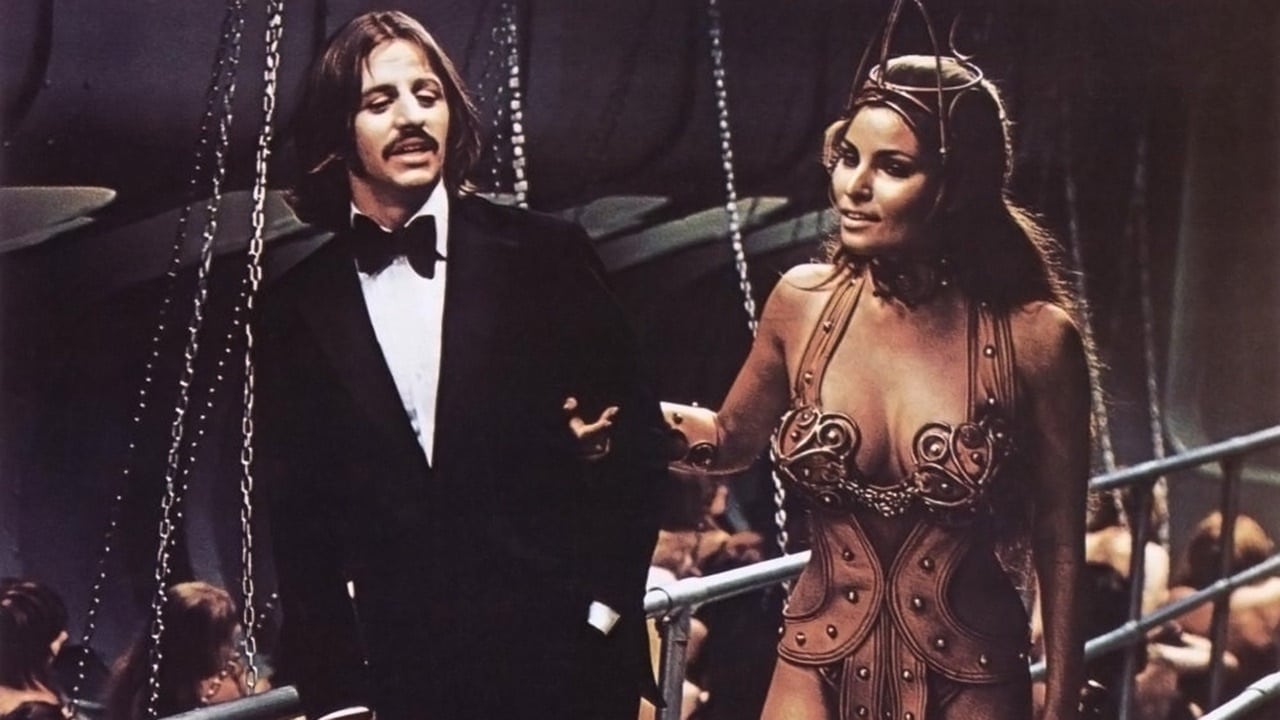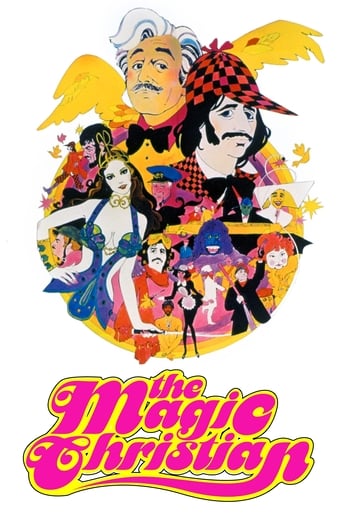

This is a must-see and one of the best documentaries - and films - of this year.
... View MoreThe best films of this genre always show a path and provide a takeaway for being a better person.
... View MoreThe acting in this movie is really good.
... View MoreIt's the kind of movie you'll want to see a second time with someone who hasn't seen it yet, to remember what it was like to watch it for the first time.
... View MoreA stable of British comedy writers of the day joined American Terry Southern, to pen the screenplay for "The Magic Christian." It's based on a novel by Southern. So, one could rightly expect some hilarious comedy, satire and antics. But this film runs out of gas quickly. The main comedy vehicle - exposure of everyman's greed, wears out after the first couple of examples. The writers seem not to have been able to come up with ideas to make the succeeding scenes funny. So, they resort to crazy antics with psychedelic effects and all kinds of mayhem. The film suffers mostly from lack of any clever, witty or truly funny dialog in the script. I found just two scenes halfway funny. For his part, Peter Sellers does fine as Sir Guy Grand, the world's richest man. He carries a manner of nobility well, even amid his many eccentricities. Ringo Starr as the tramp, whom he adopts as Youngman Grand, may just have been a come-on to attract a young audience of the day. He offers nothing by way of humor and in some scenes appears just like any curious person of the public watching a film being shot. Most of what seems intended to be funny just isn't. A couple of lines that at least led me to smile are good examples. After Sellers adopts Starr in a formal, heavy, official means, he turns and says, "Well then, Youngman Grand." To which Starr replies, "Father." Later, a guide takes passengers on a tour of a supposedly unique cruise ship, The Magic Christian. He says, "This is the poolroom" as adults play in and around a small, oval swimming pool (rather than pool tables). When the passengers are coaxed into a panic, some flee through a galley in which rows of bare-breasted women are rowing with oars. In a lengthy scene toward the end, Guy creates a cesspool in a construction site and he and Youngman invite the public to go after the free money. A tank truck delivers the cesspool contents: 100 gallons of blood, 200 gallons of urine and 500 cubic feet of animal manure. Guy then tosses stacks of British 10-pound notes into the pool. The onlookers (men and women) then troop down the construction site steps to the cesspool. And many men in formal business attire, and a couple of Bobbies go into the cesspool to retrieve the free money. Apparently, no woman would be that greedy. Is this the best they could come up with for comedy and satire? My four stars are for Sellers' performance, including a slightly humorous imitation of Winston Churchill's voice as Guy addresses a board of directors. But even that's a stretch for a generally awful film.
... View MoreThere was once a television show called 'Wudja? Cudja?' in which presenters paid members of the public to do outrageous things, such as stripping naked on beaches where no nudity was allowed. Whether by accident or design it echoed the main theme of this 1969 film, based on Terry Southern's novel. Peter Sellers plays 'Sir Guy Grand', an eccentric billionaire ( with more than a passing resemblance to ex-P.M. Harold Macmillan ) who adopts a homeless young man ( Ringo Starr ) and renames him 'Youngman Grand'. Sir Guy then gives his new son a master class in human greed, proving that each man and woman has their price. On a train, for example, he tries to buy a hot-dog from a platform vendor ( Victor Maddern ), but has no change. Not wanting to lose the sale, the vendor runs after the departing train, eventually falling off the platform. A grouse shooting session turns weird when tanks are brought into it. Crufts is disrupted by an African dog which eats the other entrants. At a posh restaurant, Grand puts on a seat-belt, and shocks patrons by smearing caviar all over his face. Grand has the great Laurence Harvey do a striptease whilst reciting the famous 'To Be Or Not To Be' soliloquy from 'Hamlet'. My favourite scene, though, is when Spike Milligan's over-efficient traffic warden is paid £500 to eat the ticket he has just planted on Grand's rolls.There is no plot as such, just Grand playing one daft prank after another. John Cleese and Graham Chapman were brought in after the script had been through ten drafts, but their work was ultimately rejected. Bits and pieces made it into the finished movie though ( others wound up in 'Monty Python' ), and both men appeared on screen. Cleese said later the movie finished up as a series of celebrity walk-on's ( Michael Aspel and Alan Whicker pop up as themselves ), and blamed director, Joseph McGrath, for not understanding comedy structure. McGrath had worked on the 1967 'Casino Royale' spoof, and it shows. Like that earlier picture, much of 'Magic Christian' is shapeless and undisciplined. The title refers to the luxury ocean liner that sets off from London for New York. Some nice digs at '60's celebrity culture here ( John Lennon and Yoko Ono are seen boarding, along with Aristotle and Jackie Onassis ). The voyage goes horribly wrong; a vampire ( Christopher Lee ) is stalking females, graffiti appears on the walls, and the Captain ( Wilfrid Hyde-White ) is attacked by would-be hijackers. Raquel Welch plays a whip-cracking priestess in charge of topless female galley slaves. As pandemonium erupts, the passengers escape, only to discover that they never left London. Sir Guy has pulled off his biggest prank ever!It is a wildly uneven picture, sometimes funny, but not the great anti-capitalistic satire it thinks it is ( its more like a ruder version of Michael Bentine's 'The Sandwich Man' ). Paul Merton liked it enough to include in his 'Big Night In' on B.B.C.-2 a few years back. Perhaps it might have been funnier if the pranks had been played on real people rather than fictional characters. Still, you have to admire its nerve. Where else would you see Yul Brynner in drag singing Noel Coward's 'Mad About The Boy' to Roman Polanski's lone drinker? The catchy title theme - 'Come & Get It' - was by Paul McCartney and performed by 'Badfinger'.
... View MoreLimited "cult following" status to the contrary, I'm not surprised at the 5.9 rating by the 1,500 odd voters accustomed to the current marginal (and copy cat) plots, limbic manipulations, clichéd special effects and derivative nature of post-millennial film-making. This, after all, is a Monty Pythonesque rendition of a Terry Southern novel (see "Candy," "Barbarella," "Easy Rider," "The Loved One" and "Dr. Strangelove "). (Would those who beat their brains senseless by pounding on their PDAs and X Boxes know the truth if it bit them in the nose? Please.)Southern saw the culture for what it is and has been since the Old Kingdom on the Nile five thousand years ago. "Money talks." Most of us want to believe we care about AIDS in Central Africa, the starving in Dafur, the oppressed in Lybia, the fate of the Tibetans, the fate of the over-populated, under-educated, over-heated, radiation-poisoned =planet=. But what we really care about is comfort, and what it takes to purchase however much of it we believe to be our due. Born in Alvarado, Texas, and strained through the sifter of military experience in World War II, Southern was no "hippie." He was far more down with Marquand, Richler, Kerouac, Ginsberg, Burroughs, Sartre and Camus than the histrionic, wanna-be-hip, but discipline-bereft and chemically crop-sprayed pseudo-intellectuals of the late '60s and early '70s. If you're into psychology, think Bateson, Baumrind, Berne, Ellis, Fairbairn, Henry, Jackson, Karpman, Klein, Laing, Miller, Schaef and Sullivan rather than Bradshaw, Dyer, Forward, Harris, McGraw and Schlesinger, for example. If you're into music lyrics, think Lennon, Morissette, Olazabal and Townshend rather than Hayward, Jagger, Lynne and Tyler. That there are people in the world who can buy the behavior of virtually anyone, including those who =appear= to be "powerful," may continue to make many folks squirm. We'd like to believe in truth, justice, freedom and the Easter Bunny. That Vegas doesn't fix major sports events, that doctors know best, and the Supreme Court doesn't steal elections. But money talks. In "TMC," that particular message is packaged a bit heavy-handedly at moments, but the piece can be as beguiling – and actually meaningful – as the similarly rompy "Rocky Horror Picture Show," "The Meaning of Life," "The Producers," "Blazing Saddles," and "Network," if one knows how to pry their mind open for 92 minutes in some (ahem) appropriate way.
... View MoreA doodlebug of a movie that is required movie by those who want to understand the Sixties better - just don't expect to understand what is going on - a complete mi sh mash of satire and irreverent fun all played out in a series of sketches that are joined by hte characters of Sellers and Ringo Starr cavorting around.This is about as far from 50s British comedy and Ealing as its possible to get: surreal, surprising, cruel, vindictive, hilarious, and just plain weird in places.It lives up to its tag line of Antiestablishment etc; and looks and feels like Monty Python before Python and with more bite.while stretching the credibility and tolerance of the audience is places it is wild viewing - and can be enjoyed on many levels.Be in the mood and you'll have a riot...
... View More